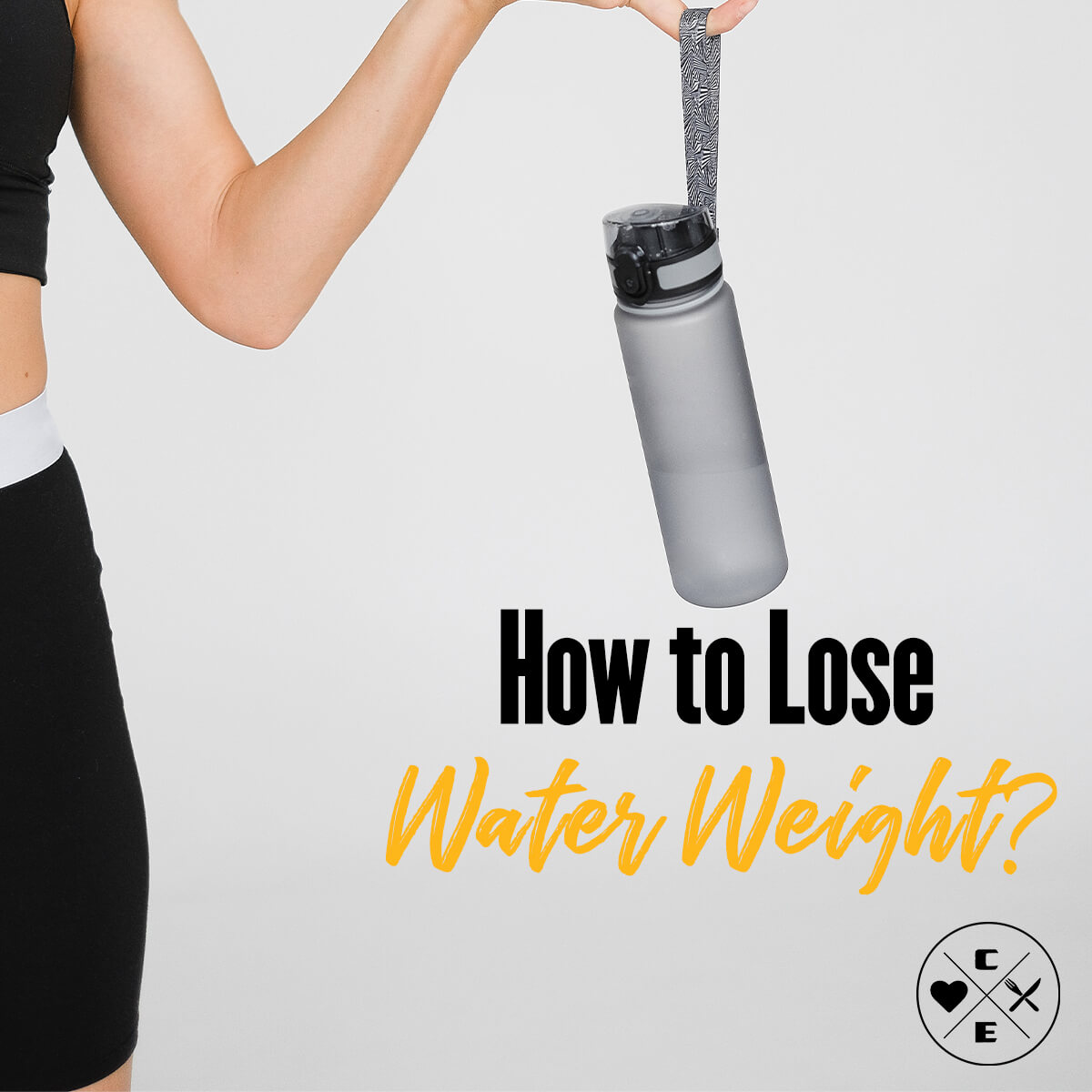
How to Lose Water Weight
Jason Nista
Exercises & Fitness
|
Weight Loss
|
Healthy Lifestyle
10 minute read
Are you tired of feeling bloated and weighed down? Do you wish to shed those extra pounds of water weight to reveal a lighter, healthier you? So how to lose water weight? Look no further! Today, we will demystify water weight, explore its importance, and uncover the factors contributing to water retention. By the end of this comprehensive guide, you'll be ready to wave goodbye to water weight and embrace a healthier, more vibrant lifestyle.
What is Water Weight?
Water weight, also known as fluid retention or edema, is the temporary increase in body weight caused by the accumulation of excess fluids in the body's tissues. So how to lose water weight? It's important to note that water weight is not the same as fat; it's simply the extra water your body holds onto due to various factors such as diet, hormones, and lifestyle habits. Don't worry, though! Losing water weight is generally easier and quicker than shedding actual body fat.
Why is Shedding Excess Water Important?
Losing water weight is essential for various reasons. Firstly, it can help you feel more comfortable, reducing bloating and that "puffy" feeling many of us dread. Additionally, shedding excess water weight may lead to a more defined and toned appearance, as it reduces the layer of fluid that can mask muscle definition. Moreover, managing water retention can help alleviate symptoms of certain medical conditions, such as hypertension and kidney disease. Finally, losing water weight can improve your overall well-being, self-esteem, and body image, making it a worthwhile pursuit.
Factors that Contribute to Water Retention
Understanding the factors that cause water retention is crucial to effectively managing and losing water weight. Several key factors contribute to water retention, including:
- Diet: Consuming high levels of sodium, insufficient water, or excessive carbohydrates can lead to water retention.
- Hormones: Hormonal fluctuations, particularly in women during their menstrual cycle, can cause the body to hold onto excess water.
- Physical Activity: A sedentary lifestyle can contribute to fluid buildup, whereas regular exercise can help promote healthy fluid balance.
- Medical Conditions: Certain health issues, such as kidney or heart problems, chronic inflammation, and lymphedema, can cause water retention.
The Root Causes
Water retention can be a frustrating and perplexing issue, but knowledge is power! Here, we'll delve into the various causes of water retention, from diet and hormones to physical activity and medical conditions. Additionally, we'll address another vital aspect of your journey: "How many calories should I eat to lose weight." By understanding these factors, including caloric intake, you'll be better equipped to tackle water weight and embark on a healthier, happier journey.
Diet and Nutrition
High Sodium Intake: Salt is a sneaky culprit when it comes to water retention. Consuming a diet high in sodium can cause your body to hold onto water, leading to bloating and discomfort. Processed foods, canned goods, and restaurant meals often contain high levels of salt, so being mindful of your sodium intake is crucial to keeping water weight at bay.
Insufficient Water Consumption: Counterintuitive as it may seem, not drinking enough water, can actually cause your body to retain more fluid. Staying properly hydrated signals to your body that it doesn't need to hold onto excess water, promoting a healthy fluid balance.
Excessive Carbohydrate Consumption: Carbohydrates, especially simple carbs like sugars and refined grains, can cause your body to store extra water. For every gram of carbohydrate stored as glycogen, your body retains around three grams of water. Reducing your carb intake, particularly from processed sources, can help alleviate water retention.
Hormonal Fluctuations
Menstrual Cycle: Many women experience water retention in the days leading up to and during their menstrual cycle. This is due to hormonal changes, specifically fluctuations in estrogen and progesterone levels, which can cause the body to hold onto extra fluid.
Stress and Cortisol Levels: Stress can wreak havoc on your body, including causing water retention. When you're stressed, your body produces the hormone cortisol, which can lead to increased water retention by influencing electrolyte balance and promoting sodium retention.
Lack of Physical Activity
A sedentary lifestyle can contribute to water retention, as regular physical activity helps to promote healthy circulation and fluid balance. Exercise stimulates blood flow and encourages your body to release excess water through sweating, making it a key component in preventing and reducing water weight.
Medical Conditions
Kidney or Heart Problems: Certain medical conditions, such as kidney disease or heart failure, can cause water retention as the body struggles to maintain proper fluid balance. If you're concerned about water retention due to a medical issue, it's important to consult with a healthcare professional.
Chronic Inflammation: Inflammation is a natural response to injury, infection, or stress, but chronic inflammation can lead to water retention. Identifying and addressing the underlying causes of inflammation can help reduce fluid buildup.
Lymphedema: Lymphedema is a condition that causes swelling in the limbs due to impaired lymphatic drainage. This can lead to water retention and should be managed under the guidance of a healthcare professional.
Effective Strategies to Transform Your Life
It's time to take charge of your health and bid farewell to water weight! With these simple and effective strategies, you'll be well on your way to achieving a lighter, healthier, and more energized version of yourself. Let's dive into these techniques that will not only help you lose water weight but also encourage a more balanced and wholesome lifestyle.
Optimize Hydration
Drinking Enough Water: Staying properly hydrated is crucial in managing water weight. Aim to drink at least eight 8-ounce glasses of water per day, or follow the popular "8x8" rule. Remember, your individual needs may vary depending on factors like climate, activity level, and body size.
Monitoring Urine Color: Keep an eye on your urine color as an indicator of hydration. Ideally, your urine should be a pale, straw-like color. Darker urine can be a sign that you need to drink more water, whereas clear urine may indicate overhydration.
Reduce Sodium Intake
Choosing Unprocessed Foods: Opt for whole, unprocessed foods to minimize your sodium intake. Fresh fruits, vegetables, lean proteins, and whole grains are excellent low-sodium options that can help you beat the bloat.
Using Herbs and Spices Instead of Salt: Enhance the flavor of your meals with herbs, spices, and other salt-free seasonings. Get creative in the kitchen and experiment with combinations like basil and oregano, rosemary and thyme, or ginger and garlic for a sodium-free taste explosion.
Increase Potassium Intake
Potassium-rich Foods: Include potassium-rich foods in your diet to help counteract the effects of sodium and promote healthy fluid balance. Load up on bananas, avocados, sweet potatoes, spinach, and yogurt to give your body the potassium boost it needs.
Benefits of Potassium in Balancing Sodium Levels: Potassium works hand in hand with sodium to regulate fluid balance. By consuming adequate potassium, you can help your body flush out excess sodium and reduce water retention.
Carbohydrate Intake
Low-carb Diets: Consider adopting a low-carb diet to help shed water weight. By reducing your carb intake, you'll decrease the amount of glycogen stored in your body, which in turn lowers water retention.
Complex Carbohydrates vs. Simple Carbohydrates: Focus on consuming complex carbohydrates like whole grains, legumes, and starchy vegetables, as they're less likely to cause water retention compared to simple carbs found in sugar and refined grains.
Regular Physical Activity
Types of Exercise to Promote Water Weight Loss: Combine cardiovascular workouts, like running or cycling, with strength training exercises to encourage water weight loss. Activities like yoga and swimming can also help improve circulation and promote healthy fluid balance.
Importance of Consistent Exercise: Consistency is key! Aim to engage in regular physical activity, ideally 30 minutes per day, to maintain a healthy weight and reduce water retention.
Natural Diuretics
Foods with Diuretic Properties: Some foods have natural diuretic properties, meaning they can help your body eliminate excess water. Incorporate foods like asparagus, celery, cucumber, and watermelon into your diet for a tasty and hydrating way to combat water weight.
Herbal Supplements: Certain herbs, such as dandelion, parsley, and hawthorn, can act as natural diuretics. However, it's essential to consult with a healthcare professional before using any herbal supplements, as they may interact with medications or cause side effects in some individuals.
Harmonizing Your Hormones
Hormonal imbalances can be a major contributing factor to water retention, but fear not! By addressing these imbalances, you can take control of your body and pave the way to a healthier, more balanced you. Next, we'll explore ways to manage stress and support hormonal balance, setting you on the path to a lighter and more energized life.
Manage Stress
Mindfulness Practices: Mindfulness techniques, such as meditation, deep breathing, and progressive muscle relaxation, can work wonders in reducing stress and its impact on your hormones. Set aside a few minutes each day to practice mindfulness and watch your stress levels — and water weight — melt away.
Time Management Techniques: Effective time management can help you stay organized and reduce stress. Try implementing methods like the Pomodoro Technique, creating to-do lists, or using digital tools and apps to streamline your daily tasks. As you master the art of time management, you'll notice a positive impact on your stress levels and water retention.
Support Hormonal Balance
Nutritional Supplements: Certain supplements, such as magnesium, vitamin B6, and omega-3 fatty acids, can help support hormonal balance and alleviate water retention. Always consult with a healthcare professional before starting any new supplement to ensure it's appropriate for your needs.
Lifestyle Modifications: Making small but impactful lifestyle changes can go a long way in supporting hormonal balance. Consider incorporating regular exercise, prioritizing sleep, and adopting a balanced diet rich in whole foods, lean proteins, and healthy fats. As you make these modifications, you'll not only address hormonal imbalances but also enjoy a healthier, more vibrant life.
Final Thoughts
The key to lasting success lies in making sustainable, long-term lifestyle changes. Quick fixes and fad diets might provide temporary relief, but genuine transformation requires commitment and consistency. Embrace the journey and make these strategies an integral part of your life for a healthier, more energized you.
Now it's your turn to take the reins! You have the power to transform your life and triumph over water weight for good. So, go ahead and take control of your health and well-being, and embark on the path to a lighter, happier, and more vibrant version of yourself!
FAQ
Is it safe to use diuretics to lose water weight?
While some natural diuretics like dandelion tea can be safe, it's crucial to consult a healthcare professional before using any diuretic supplements or medications to avoid potential side effects.
Can dehydration cause water retention?
Paradoxically, dehydration can lead to water retention as your body tries to conserve water. Drinking enough water is essential for maintaining a healthy fluid balance.
How long does it take to see results in losing water weight?
Results vary depending on the individual and the cause of water retention. With lifestyle changes, you may start noticing a difference within a few days to a week.
Are there long-term strategies to prevent water retention?
Yes, adopting a balanced diet low in sodium, maintaining proper hydration, and regular exercise can help prevent recurrent water retention.



